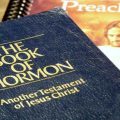Gramps,
This is my second time asking a question, the first was about blessing babies and whom we should address in the blessing prayer. You advised me to address Heavenly Father throug the entire blessing was the appropriate way. I have since blessed my 2 boys this way!
Now my question. In the book Lectures on Faith on the last page the book states “for God must change otherwise faith will prevail with him. And he who possesses it will, through it, obtain all necessary knowledge and wisdom, until he shall know God, and the Lord Jesus Christ, whom He has sent — whom to know is eternal life. Amen.”
What does it mean “for God must change”? I thought God was perfect and un changing.
Thanks for your help.
Robert
_______________
Robert,
The opportunity fathers have to name and bless their children are truly a hallmark of the Gospel of Jesus Christ. This experience should help every child begin to realize how much Heavenly Father loves us.
In light of my previous answer there have been changes to the Church Handbook regarding baby blessings and addressing Heavenly Father. We find this now in the handbook regarding priesthood blessings:
“Those who give priesthood blessings speak words of blessing (“I [or we] bless you that …”) rather than saying a prayer (“Heavenly Father, please bless this person that…”).”
The naming and blessing of a child is a “priesthood blessing”, not a prayer. This doesn’t nullify any previous blessing which addressed Heavenly Father the whole way through, however it is important that when changes are addressed we follow the brethren.
I can understand why you appear confused. The entire point to Lecture #20, is specifying how man with faith come unto God. Faith precedes apostles, prophets, evangelists, visions, healings, dreams… every gift given by the spirit. When faith doesn’t prevail, then these callings, gifts, and blessings are not present or given.
The language “for God must change, otherwise faith will prevail with him” is the confusing part. The concluding sentence is easily understood by implementing faith, as we understand it through the previous givings, “And he who possesses [faith] will, through [faith], obtain all necessary knowledge and wisdom…”
The last sentence correlates with this sentence spoken previously, “For where faith is, there will the knowledge of God be also.” And we know the knowledge of God and his son Jesus Christ is eternal life (John 17:3).
“For God must change…” appears to me to be saying that if man have faith, then God blesses his children with callings, gifts, and blessings. If man have not faith, here is where God changes, then the Lord does not continue to give callings, gifts, and blessings, but leaves his children unto their own strength (The blessing of faith remain with God, not given out). If men again exercise faith, then God again continues, or changes, and begins to bless the children of men with callings, gifts, and blessings.
A friend of mine suggested this interpretive meaning by correlating Joseph Smith’s words with D&C 82:10, “I the Lord am bound when ye do what I say, but when ye do not what I say ye have no promise.” He suggests that “the obligation of God must change” not that God himself changes.
When we do as God has commanded, then God is bound. When we do not as God has commanded, then his obligation to keep his promise is nullified.
Sincerely,
Gramps







